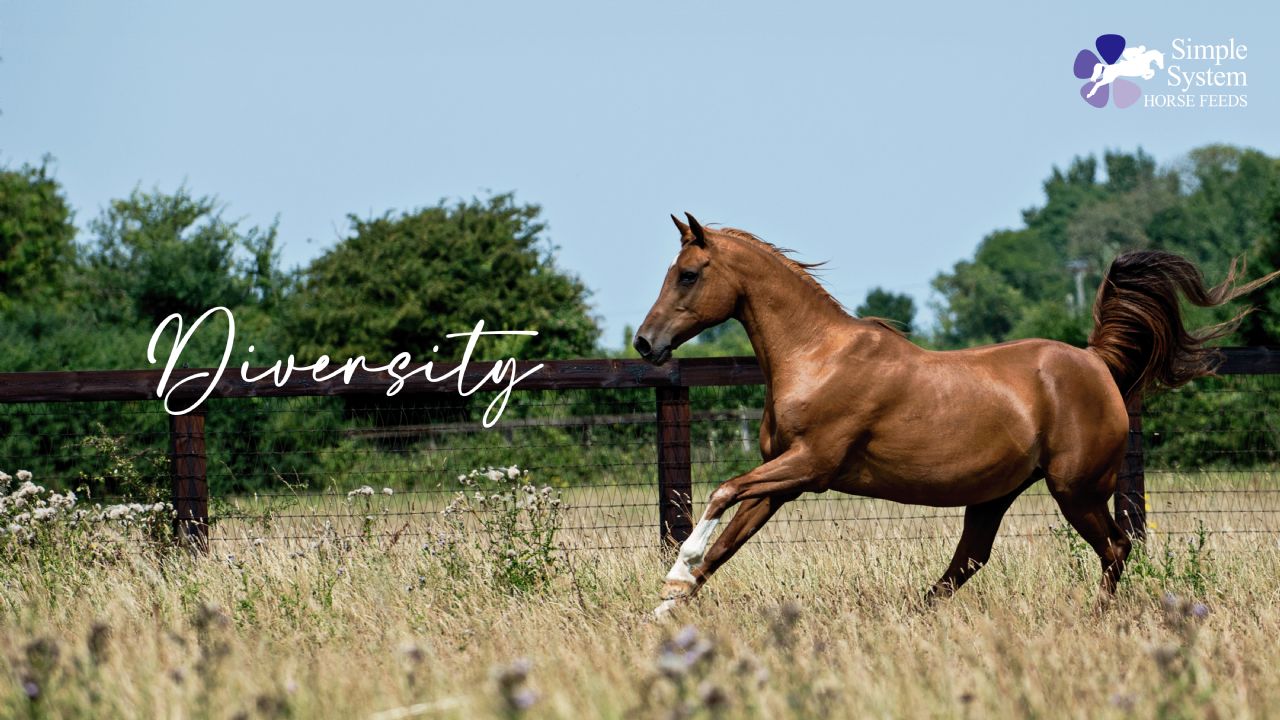Why do we recommend feeding horses from ground level?
How does the horse's jaw work? What happens if horses eat above ground level? Read the article to learn more...

It is said that variety is the spice of life and certainly the more we look, the more evidence we find that diversity and variety is good in all sorts of ways.
Horses evolved on a very diverse diet, with a wide range of grasses, legumes, forbs and herbs available, not to mention shrubs and small trees to browse on as the need arose. Their natural diet varied from season to season and even day to day. Choice, they had aplenty! Once we came along and the grazing and hay became predominantly ryegrass and the “short” feed the processed by-products of the human food industry, it must all have seemed pretty poor by comparison. Taped off paddocks with no access to hedges and over-grazed grass is a very limited substitute for plains abundant with diverse plant forms.
At Simple System, we do our best to address the lack of diversity that many horses have to endure. Variety is not only enriching for our horses but also vital for their gut microbes, which have evolved to thrive on a wide range of forages and are negatively impacted by unnatural feeds.
Diversity in your horse’s feed can be addressed by varying the forages fed. Different types of grass, such as fescue, Timothy and cocksfoot for instance; legumes such as sainfoin and birds foot trefoil. Meadow Forage Pellets are an ideal way to increase variety in the feed bowl as they contain five different forages (Sainfoin, two grass species: Meadow Fescue & Tall Fescue, Birds foot trefoil & Chicory) in one bag.
Improving diversity in the field is beneficial for horses and for wildlife. Here are a few ideas...
Fence off a strip and allow it to go to seed, spreading the range of wildflowers. Top up bare areas with a mix of suitable wildflower seeds or a hay cropping mix specifically for horse pasture like Natural Grazing Mix. Allow a bit of wildness to establish in a fenced off corner. You may even be in a position to establish some hedging on your own land - the wild dog rose (Rosa canina) can be a great option as their rosehips provide natural joint support. For those on livery or renting land, volunteer your help to your yard or field owner to create a more diverse environment for the horses.
Each and every different plant source will support, or diminish, a different range of gut microbes. Processed food will be less supportive than unprocessed. Never underestimate the value of good hay, but be very aware of the damage poor hay can do, not just to the lungs with dust and fungal spores causing coughing and even permanent lung disease, but toxins from mould can damage the liver, making the horse chronically unwell. Eating very dry food in the confines of a stable is a long way from their natural state.
Offering the best helps ensure our horses are given the greatest chance of a healthy life. By feeding the horse’s gut microbes well, with a varied diet, they in turn will look after the horse.
If you’d like to add more variety to your horse’s diet, our nutrition team will be happy to help. Contact the Feed Line on 01728 604 008 or by email to info@simplesystem.co.uk.
How does the horse's jaw work? What happens if horses eat above ground level? Read the article to learn more...
We're thrilled to be adding an exiting new event to the calendar for 2026!
Horses’ teeth change throughout their lives - they are continually growing and continually wearing, as they chew and grind their grazing and forage.